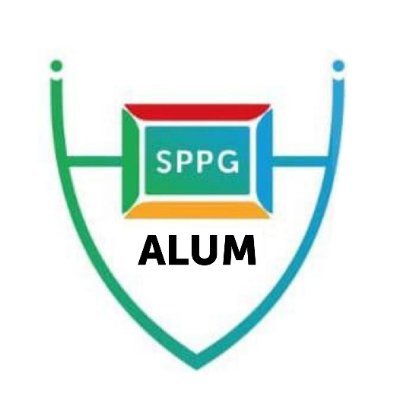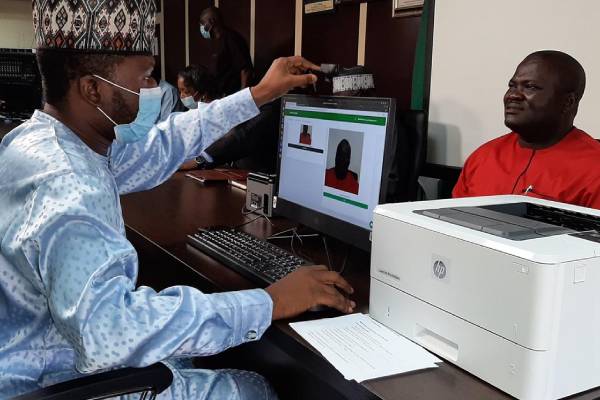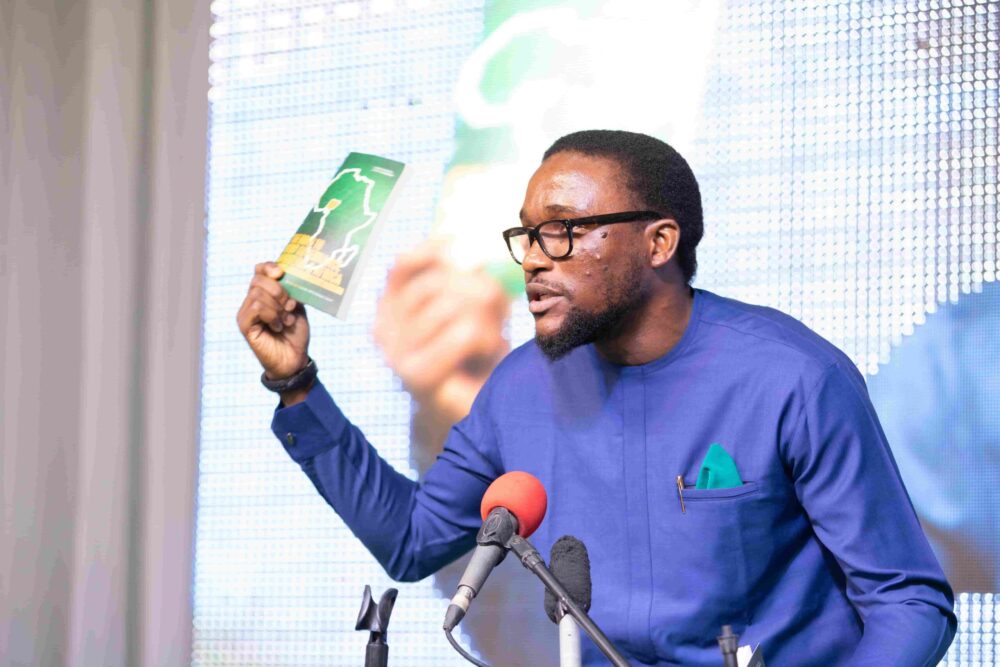SPPG Group 7 launch the Perfect Seven Project to resolve voter apathy and increase citizen participation in the electoral process
SPPG Pioneer Class 2021 Group 7, for their SPPG Capstone project, launches the perfect seven projects to resolve voter apathy and increase citizen participation in the electoral process.
Since the return to electoral Democracy in 1999, elections in Nigeria have been characterised by voters’ apathy. Only a small percentage of eligible people vote. For instance, in 2019, the Independent National Electoral Commission’s record revealed 82.3 million registered voters nationwide; during the presidential election day, only 28.6 million (a mere 35%) voted. The elected President received his mandate for a second term on the strength of votes cast by a paltry 18.5% (15,191,847) votes.
Chechet Benjamin Andrew, Ojoshide Isabel Ugbaje, Okon Glory, Timkat Nanmak Peter, Collins Okeke, Aderemi Yusuf Adewale, Dele David Ogunsoto, Omotola Adeyoju Ilesanmi, Mary Uche Emmanuel-Okorie, Chiezugolum Ijeoma Odilinye, Gold Soni Ugochi and Ode Debra Achugwu, all members of SPPG Pioneer Class Group 7 for their capstone project, launched the perfect 7 Project to increase citizen participation in the electoral process.
This project is designed to change the depressing narrative of voter apathy and galvanise the Nigerian electorates to participate actively in large numbers in the electoral process. Not just to vote but also to hold elected candidates accountable for their stewardship.
According to Group 7, “The primary target group are people aged 18+. They are people within the eligible voters range, directly influencing the outcome of an election. If they do not make informed decisions or participate in the electoral process and governance, we can achieve little or no change. According to Worldometer (October 2021), Nigeria's population of about 211 million people, about 50% are, aged 18 and above. According to INEC, there were about 84 million registered users. However, elections do not reflect these numbers, as less than 20% voted in 2019. this figure has further fallen, as we’ve observed in state and local elections. Nigeria’s population is growing at a rate of 3.2% per annum. It is estimated that the population of Nigeria will be 402 million by 2050, of which the youths make up 60%. Therefore, we are also targeting teenagers who would be turning 18 in the next two election cycles.”
To achieve the goal of the project, the Group produced video skits in different Nigerian languages designed to create a mind reorientation and move Nigerian citizens from political apathy to participation.

Video 1 -> Politics is Life, Get your PVC -> https://youtu.be/9xpL67RL3zk

Video 2 -> Politics is Life, Get your PVC in Yoruba Language version 1 https://youtu.be/6Tm1AvflsFU

Video 3 -> Politics is Life, your PVC in Yoruba Language version Get 2 https://youtu.be/OCM1LdFG2nI
The Group distributed the productions across different media platforms.
The next phase of the project is to track the number of citizens who obtained their Personal Voter Card (PVC) and voted in an election as a result of our messages and to move Nigerians to imbibe, own and act on the Group's slogans: “Politics Is Life”, “Oro Oselu Se Koko”, “Politics Na Life.”
The Group hopes this becomes a life-long project that will go beyond group 7 of SPPG Pioneer Class. According to group 7, the issue of voter apathy and citizen participation will be solved through a marathon, not a sprint. The goal is to take measured and concrete steps that lead us to our goal, and we would evaluate the impact of each step and readjust our strategy.
They have plans to engage like-minded members from subsequent cohorts of the SPPG. These fresh, vibrant members, like fresh logs of wood, will spike the fire and keep it burning into eternity.
The Road to Good Governance in Nigeria & Africa: A Students’ Memoir of the SPPG Pioneer Cohort
SPPG Pioneer Class Group 12, Naija Pillars of Equity, for their SPPG capstone project, published a book: “The Road to Good Governance in Nigeria and Africa” A Students’ Memoir of the SPPG Pioneer Cohort.
The SPPG was formed amidst rightful discontent in the repeated cycles of bad governance seen across the African continent, particularly in Nigeria. The school enrolled its pioneer cohort of students on the 1st of March 2021 and began a mission to #FixPolitics in Nigeria and Africa.
For eight months, the SPPG Pioneer Cohort went through an extraordinary journey of understanding what it takes to fix politics. Through varied lectures, assignments, and group activities, students have been transformed by experiences that are no less than remarkable.
Patience Agbamu, Olaibi Noah Adebayo, Tauheed, Halimah Nene, Uchechukwu Dorothy Anagboso, Samuel Adebayo Adekeye, Ayobami Akinyode Olunloyo, Osanyin Taiwo Oreoluwa
Oluyinka Abiodun Oyeniji, Ikenna Ogbudimkpa, Ebi Juliet Ovie-Binitie, Kenneth Eneojo Uttih
Oyindamola Adenike Olugbile, Victor Uche Obioma, and Charles Ikenna O'Tudor, all members of SPPG Pioneer Class Group 12, Naija Pillars of Equity, agreed that for their SPPG capstone project, they would compile the individual “stories of fellow students and weave it together as a coherent amalgamation of students’ experiences, directly from the frontline of the SPPG journey, are the basis of their project.
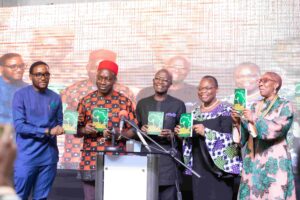
According to Group 12, “We believe that capturing this journey is necessary for a nation and a continent that need visibility of a new and positive future.” To this end, they published a book that captured various unique perspectives from members of the pioneer cohort of the SPPG.
The book was ideated through the lens of the School’s mission to educate present and future leaders dedicated to the good of the nation and ready to serve as stewards of the wellbeing of all Nigerians and its vision for a Nigeria with competent and responsible public Leadership firmly based on ethical principles and dedicated to serving the common good for the benefit of all.
The book captures how students' lives and thought patterns have significantly changed since joining the School of Politics, Policy and Governance. It is an interlinked compilation of individual SPPG experiences that challenge, excite, and encourage a new class of entrants into the school, but more aptly and ultimately into the political arena.
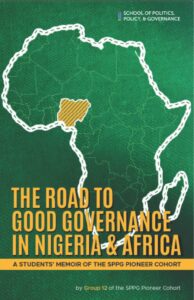
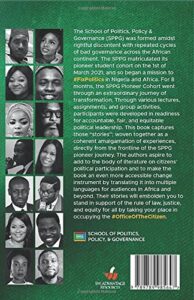
The book captures the values of accountability, respect and tolerance, stewardship and responsibility, social justice and inclusiveness, and ethical leadership (as a moral compass).
The book has been published on Amazon by members of Group12, while financial proceeds from its sales will be given back to the SPPG, with a percentage going to a charity of the school’s choosing.
The book was launched at the SPPG Pioneer Class graduation ceremony.
There are plans in the future to translate the book into French for audiences in Francophone Africa and promote the book within Nigeria and more widely across Africa and the diaspora.
According to the group, the lessons from the SPPG courses were instrumental in putting the chapters of this book together. Those who contributed to the book’s contents made references to several lectures and faculty members.
Obinna Gabriel’s grassroots advocacy helped fix a dilapidated road in Ayegbami community in Kwara State
Obinna Gabriel, SPPG Pioneer Class 2021, grassroots advocacy, helped fix a dilapidated road in Ayegbami community in Kwara State. He also took up another project designed to keep Ayegbami clean, which he named #CleanUpAyegbami.
While studying at the School of Politics Policy and Governance, Gabriel Obinna was posted to his primary assignment (PPA) place — Iman Hamzat Model College in Ayegbami — in June 2021. After getting to the community, he observed that the major road was dilapidated. As a development-oriented person, he met with some residents to determine whether the road was a top priority to them. During his meetings with residents, including their leaders, he was let in on the effects of the bad road; two children were said to have died in a flood and economic activities crumbled due to inaccessibility to seven neighbouring communities.
Leveraging his education at the SPPG, Gabriel conducted a needs assessment; he knew that this particular problem existed in Ayegbami, but he needed to be very sure; he went around the community and met with people to understand the magnitude of the problem. He met with people who stay at home, people who sell things in shops, people in his PPA and community leaders. After meeting with the residents, they assured him of their support in proffering solutions to the problem. The community leaders also gave him a letter detailing the challenges faced as a result of the road.
In July 2021, Gabriel drafted a project proposal, including the estimated budget.
Gabriel sent letters to several non-governmental organisations and business enterprises to get support for the project. He equally wrote to media organisations to create awareness for the plight of residents of Ayegbami.
His initial plan was to crowdfund, but he changed gears after realising that raising the estimated budget for the road project would be difficult.


In August 2021, a member of the community advised him to reach out to Abdulganiyu Cook Olododo, the federal lawmaker representing the Ilorin East/South constituency. After contacting the lawmaker, Gabriel was invited to visit the constituency office to discuss the project.
Courtesy of Gabriel’s intervention and advocacy, the construction of the road was added to the list of projects for the constituency in 2021.
In September 2021, construction works started on the road, which brought excitement to the residents as their dream of having a good and accessible road was becoming a reality.
In January 2022, the construction was completed — and it was a dream come true for residents of Ayegbami as their biggest challenge was finally in the rearview.
Speaking about his motivation, Gabriel Obinna said he is always looking for problems to solve wherever he finds himself.


He believes he can always mobilise people to proffer solutions to daunting societal challenges. For Gabriel, the slogan is — to seek ways to solve problems instead of complaining. Gabriel did not stop at the advocacy intervention for road construction. He took up another project designed to keep Ayegbami clean, which he named #CleanUpAyegbami.
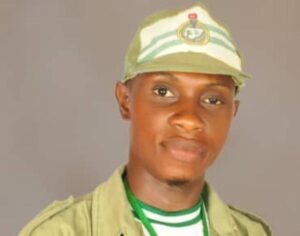
Gabriel designed the project after observing that Ayegbami was in a “serious environmental mess” as all open spaces were used as dumpsites.
For the project, he sensitised residents of the Kwara community on the importance of cleanliness and waste evacuation.
Although his work in Ayegbami thrust him into the spotlight, Gabriel’s knack for development advocacy did not start there. As a departmental president in UNIBEN, he established the first library in the institution’s department of mass communication and mobilised students to donate books to set up the library.
According to Gabriel, “I’m not the type who would rather complain than look for solutions,”.
